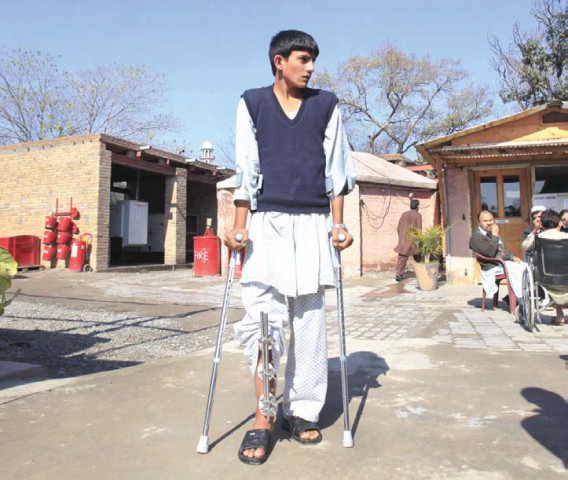Conflict zone: The human cost of war in the north
Dozens of civilians maimed in bombings raised doubts over govts assertions that conflict zones have been stabilised.

Policymakers and their American backers take a strategic view of the war on al Qaeda-backed militants, often overlooking the scale of civilian casualties which can shed light on what progress has been made.
People like Ishaq Khan, 13, see few signs that security is improving in the northwest, the epicentre of the conflict between the government and the Taliban. His leg was blown off by a landmine.
“I was playing in a corn field with my two friends and I had taken my shoes off, when I stepped on something,” he said from his bed in a hospital run by the International Committee of the Red Cross (ICRC) in Peshawar.“We just want peace,” said Khan, as he sits up on his hospital bed with his leg stump exposed.
That’s unlikely anytime soon in Pakistan, which the United States views as a crucial ally in its global war on militancy.
Despite a series of military offensives against the Taliban, civilians remain highly vulnerable to militant attacks and are likely to lose confidence in leaders if the violence doesn’t ease, analysts say.
The Campaign for Innocent Victims in Conflict (CIVIC), a US advocacy group, says there were likely more civilian casualties in Pakistan in 2009 than in Afghanistan.
In 2010, 3,570 civilians were killed in the war between government forces and militants, slightly more than the previous year, according to the Pak Institute for Peace Studies.
Taliban militants have been digging in despite pressure from the military. Public confidence in the government is likely to erode, if the violence does not ease.
Random killings
Bloodshed is often random. One man was gathering firewood when he was hit by a blast. Gulzada, 45, was riding his donkey cart past a government office when a bomb sprayed shrapnel into his legs.
“The situation is getting worse,” said Gulzada. Staying home isn’t safe either. His family dug out tunnels beneath their home to hide during battles.
“The paramilitary forces closed shops in our village. We have to keep moving around when there is fighting.”
Even if military operations succeed, long-term stability hinges on better governance and economic development in lawless tribal areas in the northwest, ideal bases for militants.
Until then, the ICRC surgical hospital for war wounded, which has treated more than 1,600 patients since opening in 2009, is likely to keep busy.
The patients, when interviewed, do not take sides in the conflict. But most doubt security will improve.
Published in The Express Tribune, February 10th, 2011.













COMMENTS
Comments are moderated and generally will be posted if they are on-topic and not abusive.
For more information, please see our Comments FAQ